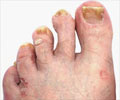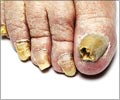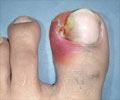Post-COVID-19 pandemic, experts reinforce the need to continue nail hygiene to further curb the deadly viral spread and various diseases.
- Nail hygiene is the discernible index of the body’s well-being
- COVID-19 pandemic has reinstigated the global attention to nail hygiene
- Avoiding nail hygiene makes one prone to viral infections
- It is thereby important to continue practicing good nail hygiene even after pandemic to keep critical diseases at bay
Read More..
Significance of Nail Hygiene
Nail hygiene is one of the crucial gateways to proper overall health. However, it is also the most neglected aspect of hygiene practices. Although some may wash their hands regularly, ensuring cleanliness underside of the nails may often fail to grab one’s attention. The underside of the nails engenders a surplus amount of germs and bacteria that is the root cause of several viral, bacterial infections, and critical diseases.Post-pandemic Nail Hygiene
The worldwide pandemic of COVID-19 has re-instigated the importance of nail hygiene. However, with the global recovery from COVID-19, a concern arises if we are retaining or losing our alertness to curb the deadly viral spread.“Practicing good nail hygiene involves following a systematic process to ensure the longevity of nail health. It includes ensuring “food particles, dirt, dust are not sticking to our nails and there is no build-up of nail bacteria,” says Rajesh U. Pandya, managing director, Kai India.
In countries like India, where one is accustomed to using their bare hands for almost every purpose including eating, hand hygiene remains incomplete without nail hygiene. All it demands is attentiveness, awareness, and contemplation to keep our nails healthy.
Hygiene Measures for Nails
- Maintain your nails clean and dry. This prevents the pathogens from breeding on nails.
- As one does not share personal hygiene products, it is equally important to deny sharing nail clippers with others. Nails anchor a plentiful amount of germs, viruses, and bacteria that may be exchanged by sharing those clippers.
- Prolonged water exposure may make the nails brittle. Hence, one may consider using cotton-lined rubber gloves when cleaning, washing, or handling harsh chemicals.
- It is equally wise to choose healthy nail care products, free of acetone products.
- Prefer using a sharp stainless-steel nail clipper with a grime remover to get rid of those hidden germs below.
- Trimming your nails keeps them healthy; Trim them short, straight, and gently curve around the tips as longer fingernails may dock in more dirt and pathogens.
- Always use soap and water to wash your hands and nails after nail clipping; generally washing hands for a minimum of 20 seconds is ideal.
- One should be careful in clipping off hangnails; avoid pulling off the hangnails.
- Moisturizing the hands and nails helps prevent the cuticles from overgrowing.
- Refrain from over-using of nail paint remover, hand sanitizers, and harsh soaps as they can dry out the cuticles.
- Avoid chewing or biting fingernails as it may harvest nails germs directly to the mouth.
- Seek a dermatologist if you face persistent nail ailments.
Fun Facts on Nails
- The growth rate of fingernails is around 0.1 millimeters per day, that is, 3 - 4 millimeters per month.
- Fingernails tend to grow faster in summer; this may be because Vitamin D from sunlight may amplify the growth of nails.
- Toenails have half the growth rate of fingernails, which is a ~1.6 millimeter per month.
- Not all fingernails grow at the same pace. Thumbnails have the highest growth rate while those on middle fingers have the slowest.
- Long nails are pride to certain groups. Although the artificial nails were created in 1954, there are historical lines of evidence suggesting the use of artificial nails by women, way back in Ancient Egypt and the Ming Dynasty in China.
- Men have faster growth of fingernails than women do that is 3.5 millimeters per month.
- The longest record of fingernails was gained by an American man – Melvin Boothe with a nail length of 9.85m in 2009.
- The persistent habit of biting the fingernails is called onychophagia. Almost 25-30% of children have onychophagia.
- The substance responsible for making up your nails is the same involved in hair – the keratin molecules; however, their molecular arrangement renders resilience to nails.
- Nails are dead cells. They do not breathe like other body cells; however, they require blood for survival and healthy growth.
- Stress may also hinder nail growth.
- Hand use may stimulate nail growth. Longer nails are often observed on the dominant hand than on the non-dominant hand.
- Did you know that your fingernails do not sweat?
- One of the most tangible rumors is whether fingernails continue to grow after our death. Well, the answer is no. Fingernails cease to grow, similar to other body parts after death.
References:
- Nail Hygiene - (https://www.cdc.gov/healthywater/hygiene/hand/nail_hygiene.html)
- Fun facts about fingernails - (https://www.lcbt.co.uk/2019/07/12/fun-facts-fingernails/)
Source-Medindia
















